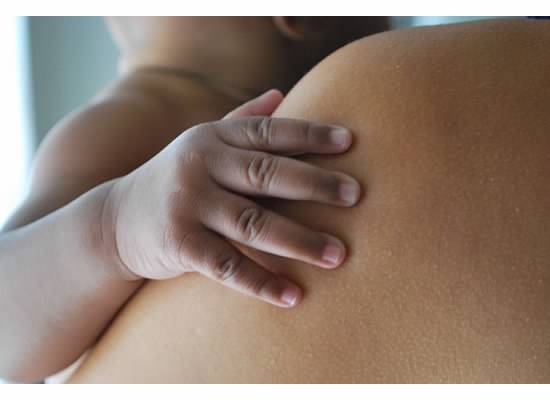
I was running errands with my youngest two children in tow when an acquaintance of ours spotted us and came over to say hello. She looked at my son, marveling over how much he had grown since she last saw him a few months ago.
"Yes," I smiled, "He's a big boy!"
She replied, "Such a cute little thug."
My son is 2 years old.
As a black male, I knew he would inevitably face discrimination, and that this would be increasingly true as he got older and bigger. I knew that unlike my friends mothering white boys, I would have to prepare my son for racially-motivated encounters with police, teachers and store managers. We would have to discuss with him the fears and prejudices that some parents may face when my son wants to hang out with or date their children.
What I didn't realize was how early in my son's life he would be stereotyped, labeled and feared.
The "thug" encounter wasn't the first time I had felt the weight of parenting a black boy in America.
A few weeks ago, I took my children to a preschooler's paradise: the local children's museum. My toddler was drawn to the iPad set up in the play bank. He happily had full reign of the device for several minutes until a fellow toddler arrived, a white girl dressed in jeggings and a peasant top, her wispy hair in pigtails accessorized with oversized bows. She ran over to the bank area, eager to play with the iPad.
I watched as my son's arm reared back, and I thought he was preparing to protect the toy by hitting or pushing the little girl, typical of a toddler. Instead, he put his arm around the little girl's shoulders, gently pulling her in closer, and together, they pushed buttons on the device.
I proudly smiled at the little girl's mother, who was standing nearby and remarked how sweet our two children were being. She smiled and replied, in a flirty tone, "Your son is like, 'Hey, girl.'"
Later, as I reflected on the incident, I wondered why the little girl's mom felt the need to make such an uncomfortable and inappropriate comment. Why would she attempt to sexualize the innocent interaction between two babies? Why would she choose to remark that my diaper-wearing, word-babbling son was motivated to react gently other than the fact that he's a kind child?
This incident occurred not long after our St. Louis community made national news with the shooting of Michael Brown. Every television and radio channel was inundated with footage and sound bites from the riots and press conferences taking place in Ferguson, a town just 25 minutes from our home. My husband and I stayed up late several nights in a row, our eyes glued to the chaotic scenes on the television, our hearts heavy and our minds reeling. We alternated between watching the news and glancing at our phones, reading the social media comments about "those people" who were protesting and the residents of Ferguson.
One evening, my children asked to watch "Doc McStuffins" while I prepared dinner. I turned the television on, and Mike Brown's face filled the screen. My 6-year-old daughter looked at me and said, "Who is that, Mommy?"
Immediately, my eyes filled with tears, and I mustered enough strength to say, "He was a boy getting ready to go college." I started the kid's show and walked into the kitchen, tears streaming down my face.
Seeing Mike Brown's face reminded me of the previous spring, when I heard my three children giggling from the baby's room. I opened the door to find the kids sitting on the carpet, sunshine streaming in through the open windows. The girls had put my son's shirt hood up, and he was nodding his head furiously, enjoying the sensation of the fabric against his hair. He was grinning and growing increasingly giddy as the girls clapped and laughed at the funny faces their brother made.
I smiled at their sibling silliness until I realized that my son, just a 1-year-old boy, was a black boy in a hoody, laughing and playing like kids do. Enjoying life. Relishing in the attention of his siblings.
But soon, too soon, he will go from predictably garnishing smiles and compliments from strangers to being the target of their fears and ignorance. He will go from being called and thought of as "cute" and "sweet" to "suspicious" and "threatening." His brown skin, brown curly hair and brown eyes will render him less-than compared to his peachy-skinned peers. His physical differences will make him more likely to be feared and subsequently harmed by authority figures. He will goof around in parks with friends, he will walk to gas stations to get snacks, he will sit in a parked car with friends with music blaring. He will make teenage mistakes, and he will hopefully live through those times.
To the lady who called my son a thug, calling him out as one of "those people," I know you were merely saying exactly what you were thinking, what much of America is thinking. You have been taught to fear, categorize and label. You look at my baby boy as a budding criminal, just as the lady at the children's museum labeled my son a future baby daddy. You spoke taught-and-believed truth.
And in your single word choice, you struck fear in my heart, all over again. Because no matter how well-dressed and well-spoken my son is, no matter how kind his actions and how educated his mind, society continues to believe that he is guilty of one thing or another, even if he is only a baby.
Photo credit: La Jolie Vie Photography
 Like Us On Facebook |
Like Us On Facebook |
 Follow Us On Twitter |
Follow Us On Twitter |
![]() Contact HuffPost Parents
Contact HuffPost Parents
Also on HuffPost:

